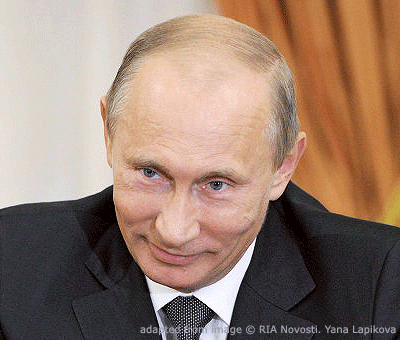Putin Forever

(RFE/RL – rferl.org – Brian Whitmore – November 5, 2014) As one of his activities marking the Unity Day holiday, Vladimir Putin joined Patriarch Kirill to view an exhibition commemorating the Rurik Dynasty, which established tsarism in Russia and ruled for seven centuries.
What kind of message was he trying to send? If you look hard enough, and even if you don’t, it is pretty easy to find signs that Putin intends to stick around for a long, long time.
There was, of course, Vyacheslav Volodin’s oft-cited remark that “as long as there is Putin, there is Russia. Without Putin, there is no Russia.”
There was also Putin’s “Class of 2014,” the large cadre of people in their 20s and 30s who are being recruited from poor families in Russia’s far-flung provinces, vetted for loyalty to Putin, and brought to Moscow to fill low- to midlevel posts in the bureaucracy.
And there was the most recent report by Kremlin-watcher Yevgeny Minchenko, who tracks the balance of power within the elite. Minchenko concluded that due to the “sharp rise of Putin’s rating after the reunification with the Crimea, the subject of succession within the president’s circle has been removed.”
We’ve long passed the point where it’s feasible to expect Putin to leave the Kremlin and enjoy a peaceful retirement.
That could have happened back in 2008. Remember those rumors that he was going to head up the International Olympic Committee? It could have happened in 2011-12. Had Putin chosen to allow Dmitry Medvedev to serve a second term, he could have continued to rule from the sidelines like China’s Deng Xiaoping — enjoying de facto power without responsibility or accountability.
But at this point, there isn’t a safe exit route from the Kremlin.
Putin isn’t going to leave willingly. He certainly isn’t going to be removed through the sham events Russia calls “elections.” A popular revolution is unlikely to say the least — a Russian ruler hasn’t been overthrown in one of those since 1917. Which leaves a palace coup, which was always the most plausible scenario — but one that looks increasingly remote.
But as remote as it is, Putin is clearly not taking any chances.
And this, I believe, is the context in which we need to view the rumors that surfaced last week that Interior Minister Vladimir Kolokoltsev was about to be sacked and replaced by longtime Putin loyalist Viktor Zolotov.
Writing on his blog “In Moscow’s Shadows,” New York University professor and Russian security expert Mark Galeotti described Kolokoltsev as “a proper professional copper, rather than a yes-man transplant from the security agencies” like his predecessors, Boris Gryzlov and Rashid Nurgaliev. He also has support among the rank and file.
“None of that necessarily counts, though, and it is perhaps more important that Kolokoltsev is a professional, not a courtier, with no traction in Putin’s inner circle,” Galeotti wrote.
“In other words, he is just a ‘manager’ there to do his job, and can be discarded freely — as far as the Kremlin is concerned — when he becomes inconvenient or simply someone more convenient comes along.”
What is also important at this point is that Kolokoltsev is the only official in the so-called “power bloc” who is not a Putin uberloyalist. FSB chief Aleksandr Bortnikov, Defense Minister Sergei Shoigu, and Security Council Secretary Sergei Ivanov are all considered politically reliable.
So, probably, is Kolokoltsev. But certainly less so than Zolotov, who is currently Kolokoltsev’s first deputy and commander of the Interior Ministry’s 170,000-strong paramilitary forces.
Dozhd TV’s Anton Zhelov cited unidentified defense ministry sources as saying the “probable reason” for Kolokoltsev’s vulnerability is that “he is not part of the president’s inner circle, and that in the current environment, this is particularly important. Zolotov is the ideal candidate.”
Zolotov and Putin go back. They met in the 1990s when both worked for St. Petersburg Mayor Anatoly Sobchak — Putin as deputy mayor and Zolotov as chief of security. Zolotov followed Putin to Moscow and his career has been on an upward trajectory ever since.
“A former head of Putin’s personal security (and indeed, one of the president’s judo sparring partners), Zolotov has a reputation as a tough loyalist, a ‘maximalist’ in the words of one Russian cop, whose interests are in protecting his patron rather than necessarily upholding the law,” Galeotti wrote.
Indeed, according to Sergei Tretyakov, a Russian security official who defected to the United States in 2000 and died under mysterious circumstances in 2010, Zolotov once made “a list of politicians and other influential Muscovites whom they would need to assassinate to give Putin unchecked power.”
Tretyakov’s account has never been corroborated.
Dozhd TV reports that if Kolokoltsev is removed and replaced by Zolotov, it would likely only be after the November 10 Police Day holiday.
“If this does happen, it’ll be a clear sign that the Kremlin is manning the barricades and preparing for trouble ahead,” Galeotti wrote.
Which brings us back to the Rurik dynasty. Its long reign ended in 1598 with the political chaos, civil uprisings, usurpers, foreign occupation, and famine of the Time of Troubles.
Putin has long suggested that, should he leave the scene, this would be the result. But by monopolizing power, eliminating all alternatives, destroying Russia’s institutions, and suppressing its civil society, he is making the ground fertile for political upheaval when he does finally go.
And like all mortals, he will eventually go — and that will be his legacy.
Article from Radio Free Europe/Radio Liberty – rferl.org – © 2014 RFE/RL, Inc. Article also appeared at rferl.org/content/putin-forever/26675405.html
